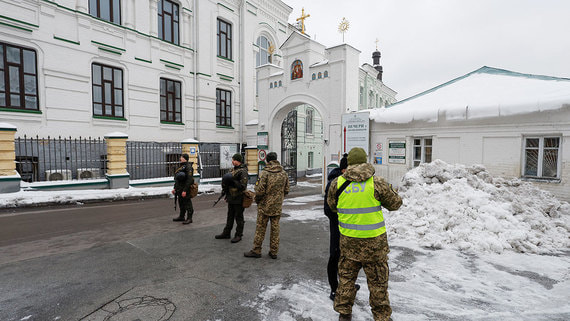A draft law on banning the Russian Orthodox Church has been submitted to the Verkhovna Rada
[ad_1]

Deputies of the Verkhovna Rada of Ukraine proposed to ban the activities of the Russian Orthodox Church (ROC) on the territory of Ukraine. On November 23, a bill on this was introduced by the deputy Nikolai Kniazhitsky, who is a member of the party of ex-president Petro Poroshenko “European Solidarity”. The co-chair of the faction of this party, Irina Gerashchenko, said that the purpose of the ban on the Russian Orthodox Church is to ensure order and strengthen the country’s national security.
“The liberation of Ukraine from the ROC is another step towards a free and independent Ukraine,” Gerashchenko argues. According to her, in the Kiev-Pechersk Lavra, which belongs to the jurisdiction of the Ukrainian Orthodox Church, which has not yet canonically separated from the Russian Orthodox Church, an “anti-Ukrainian Kremlin nest has been created that has nothing to do with religion and the church.”
The initiative to ban the Russian Orthodox Church was put forward shortly after the SBU raid on the Lavra on November 22. On November 22, the Ukrainian Internet publication Strana.ua reported that the SBU “came with searches” to the territory of the Kiev-Pechersk Lavra. Later, the special service stated that it was “carrying out counterintelligence activities” in this territory. The official representative of the Russian Foreign Ministry, Maria Zakharova, in response to this, said on November 23 that there was no explanation or justification for the searches in the Kiev-Pechersk Lavra: this was a new manifestation of the immorality of Kyiv.
Before that, a video appeared on social networks, in which her parishioners allegedly sang a song with the words: “The ringing floats over Russia. Mother Rus’ is awakening. Such information was published on November 13 by the priest of the so-called Orthodox Church of Ukraine (OCU) Mikhail Omelyan, which the ROC considers a schismatic structure.
In response to the acting chairman of the SBU, Vasyl Malyuk, on November 15, he said on the department’s Telegram channel: “Those who <...> waiting for the awakening of Mother Rus’, we must understand that this harms the security and interests of Ukraine and our citizens. And we will not allow such manifestations.” Metropolitan Pavel, viceroy of the Kiev-Pechersk Lavra, emphasized that the UOC had nothing to do with what happened, and the performance of the aforementioned religious hymn was the initiative of a group of laity. Archimandrite Polycarp, the steward of the Lavra, added that “at the highest level of the Lavra hierarchy, this priest [проводивший службу во время исполнения песни] suspended from worship, the spiritual council of the Lavra will meet in the near future, which will analyze this situation and decide who should be given what punishment.”
On the territory of Ukraine, since December 15, 2018, along with the canonical church, the OCU has been operating. The schismatic church was created thanks to the efforts of Poroshenko and Patriarch Bartholomew of Constantinople. Formally, the OCU is an autocephalous church, but according to its founding documents, it is subordinate to Constantinople. With the start of a special military operation, the OCU increased its pressure on the UOC, many of whose churches were either captured or transferred to the jurisdiction of schismatics. The official dissociation of the UOC from the position of the ROC did not help the canonical church. On May 27, the UOC held a council, at which it decided on “complete independence and independence,” and also condemned Patriarch Kirill of Moscow and All Rus’.
Gerashchenko’s bill comes from an opposition party and may well be rejected, says Denis Denisov, director of the Institute for Peacekeeping Initiatives and Conflictology. In his opinion, the Ukrainian leadership will proceed from common sense and will not split society along religious lines in the conditions of hostilities. The current president of Ukraine is a secular person, the expert adds, and he is not too interested in the problems of religion. In addition, the situation with Orthodoxy in Ukraine is so complex and complex that its regulation would require considerable technical skill. But if the law is passed, it will lead to the segregation of millions of Ukrainians along religious lines, Denisov concludes.
The initiative to ban the Russian Orthodox Church was generally expected, explains Andrey Kortunov, director general of the Russian International Affairs Council. Kyiv is cunning when it presents the UOC, canonically subordinate to the Moscow Patriarchate, as an obedient instrument of the Kremlin. In Ukraine, the canonical church acts independently, as evidenced by the decision of the May Council on autonomy from Moscow, which did not meet with sharp condemnation from the Russian Orthodox Church. Nevertheless, the Ukrainian authorities are strongly opposed to the UOC, and its official disengagement from the Moscow Patriarchate is unlikely to completely protect it from repression, sums up Kortunov.
[ad_2]
Source link








